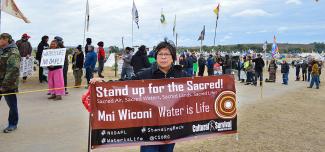
Standing Rock is a highly complex intersection of environmental issues, treaty rights, Tribal sovereignty, Indigenous rights, human rights, and development interests. The camps became a space where the issues catalyzed along “Water is Life,” and Standing Rock became a new resistance, or more accurately an enduring resistance in new times. American Indian Tribes have a long history of struggle with corporate interests for natural resources on our lands, and an equally long struggle for the right to manage our own resources. Recently, I listened to one of my Tribal leaders declare that our Navajo Nation is an energy state dependent on the resources provided by energy development. Bristling at the statement, I had to step back and think about our history of dispossession and deceit resulting in broken treaties, theft of land, and externally established Tribal government designed for the purpose of signing leases with corporations. Today’s reality is that Indian Tribes are concerned with economic development and their rights to manage their resources.
The decisions Tribal Nations make about economic development determine the future of our children. We know that the impact of uranium development will last thousands of years, and that coal mining, oil and gas development, and fracking pose immediate threats to our environment and health. I can only ask the most important question: are we choosing life? Our spiritual knowledge guides us as we pray to sustain life, harmony, and balance. We respect and honor our relationships with the natural world. This worldview is the antithesis to the industrial globalization paradigm of greed that has colonized Indigenous Peoples everywhere and continues as we now struggle with decisions about economic development, self-sufficiency, and self-determination. We are resilient people living today with many problems and need resources to address them.
The voices in this issue of the CSQ address these complex questions. As Clayton Thomas-Müller states, “In the era of a 1.5 degree imperative, we know that none of these pipelines can be built. We have won the scientific, economic, and the justice based arguments against new fossil fuels infrastructure, and that is why these projects for being part of Cultural Survival. are being so vehemently opposed.” The movement rising out of Standing Rock has brought to light the struggles that Indigenous Peoples face every day in defending the sacred—water, air, life. It has spearheaded and fortified the global movement against fossil fuels and Indigenous people are very much leading the fight across the globe.
The Spokane Tribe is implementing their vision of being a truly sovereign and independent Nation by switching to renewable energy and instilling these principles in their youth. As Jason Campbell says, “Working with the middle school and high school on renewable technologies, you have the implicit lessons conceptualizing self-determination. They are conceptualizing themselves as the industry leaders rather than an employee of the system, and can demand that what gets designed around them is efficient, healthy, income-generating, and reflects their cultural values.”
The Native Sustained Community Project at Standing Rock uses Indigenous knowledge to guide people back to balance by making their Vision 2030 Decree a reality: “We feel it is our duty to guide the world back into balance in a manner that provides for our life needs without destroying the source—Our Mother Earth. Our story will end unless we figure out a way to live harmoniously with the natural elements of the Universe. We seek to integrate systems that support our rights as Indigenous people on the planet—water, food, shelter, energy, and a sustainable form of economy.”
While the focus is on Standing Rock, we are cognizant that Indigenous Peoples around the world are resisting development on their lands and territories. Agnes Leina speaks to the challenges Indigenous Peoples face in East Africa by not being included in international and national policymaking. She reminds us that whether they involve fossil fuels or renewables, all energy projects need to obtain Indigenous Peoples’ Free, Prior and Informed Consent and incorporate true benefit sharing.
Suzanne Benally, Executive Director
(Navajo and Santa Clara Tewa)
